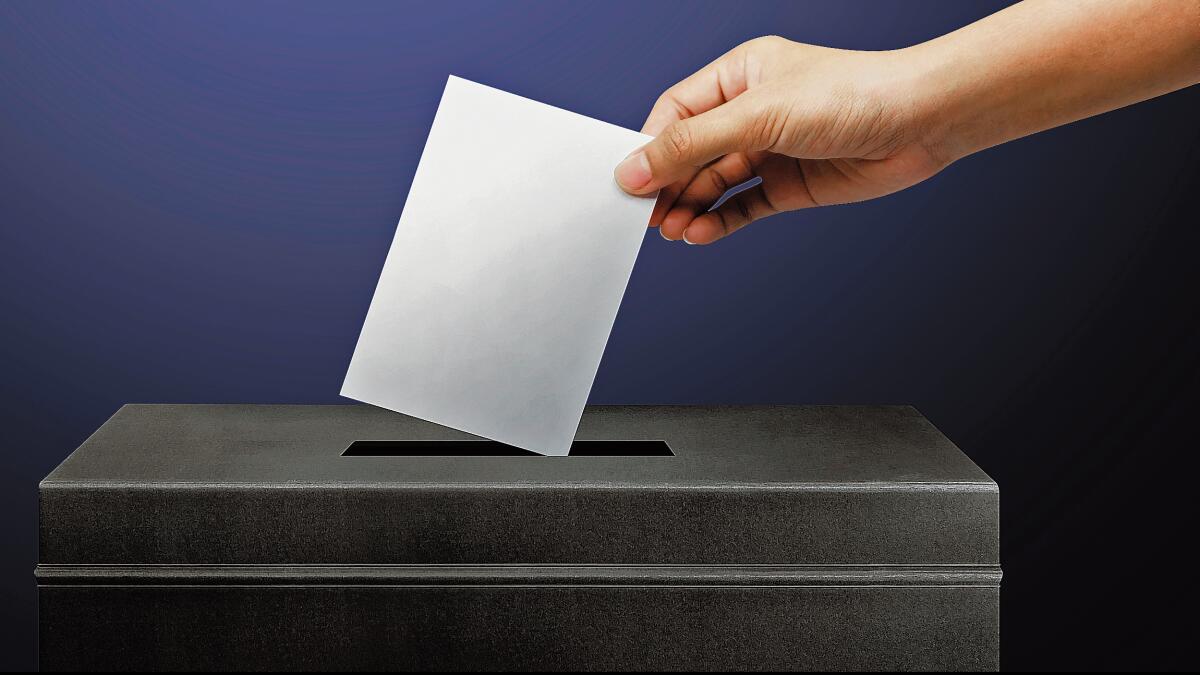Elections are a terrible way to select judges. That means you, Wisconsin

- Share via
The surprising victory of Jill Karofsky in the election for a seat on the Wisconsin Supreme Court is making national headlines, including this one from Monday’s New York Times: “Upset Victory in Wisconsin Supreme Court Race Gives Democrats a Lift.”
My first thought on reading this was to recall Chief Justice John G. Roberts Jr.’s claim, in response to President Trump’s criticism of “an Obama judge.” Roberts said: “We do not have Obama judges or Trump judges, Bush judges or Clinton judges.”
But the incumbent who was defeated by Karofsky, Justice Daniel Kelly, was in a sense a Trump judge. The president had endorsed Kelly, and later claimed that Wisconsin Democrats had tried to postpone the coronavirus-haunted election because of that endorsement.
Officially, the Wisconsin Supreme Court election was nonpartisan, but just as the conservative Kelly was favored by Trump, Karofsky received financial help from the state Democratic Party.
In some states, such as my native Pennsylvania, partisanship in judicial races is out in the open. Candidates for the Pennsylvania Supreme Court are nominated in Democratic and Republican primaries, and in the general election their party affiliations appear on the ballot. But even in some states with nonpartisan elections, the parties are important offstage players.
More than 20 states choose members of their states’ highest courts in elections; in the others, the governor or in some cases the legislature makes the choice, though the voters may have an opportunity to weigh in later. (In California, the governor nominates a candidate for the high court who must be approved by the Commission on Judicial Appointments and ultimately by the voters.) In states that do elect judges of the highest courts, special-interest groups are increasingly taking an interest and spending large amounts of money.
To which some might object: Why shouldn’t judicial selection be an openly political process? Judges, and not just on the U.S. Supreme Court, make decisions that profoundly shape the lives of citizens — in some ways more than legislatures do. And if party labels serve as a reliable shorthand for a would-be legislator’s political philosophy, don’t they also correlate in many cases to judicial philosophy?
At a time when newspapers routinely identify federal judges by which president nominated them and judicial confirmation votes in the U.S. Senate break down largely on party lines, it might seem naïve to insist that judges are — or at least ought to be — something other than politicians in black robes.
But I would still maintain that there is a difference between legislating and judging, a point that’s easier for judges to remember if they are appointed rather than elected with an R or D after their names. The assumption that judges represent political parties also undermines public confidence in decisions that are in fact defensible as a legal or constitutional matter.
When the Pennsylvania Supreme Court in 2018 handed down a decision striking down a Republican gerrymander of the state’s congressional districts, news coverage of the ruling highlighted the fact that a majority of the justices had been elected as Democrats. All the Democratic justices concluded that the Republican-drawn map violated the state constitution, though one Democratic justice dissented from parts of the majority opinion. Both Republican justices dissented.
Having worked for decades in Pennsylvania, writing editorials arguing that the state should switch to the appointment of judges, I understand the cynicism about the gerrymandering decision, even though it righted an obvious injustice. When judges are chosen in partisan elections, it’s natural for voters to assume that those judges will see their mission as protecting the party’s interests — even when that’s not how the judges themselves see their role.
Partisanship aside, judicial elections are a bad idea. Despite the best efforts of editorial boards and bar associations, voters seldom know much about the qualifications of judicial candidates. In Pennsylvania, elections for statewide judgeships sometimes turned on ballot position, a candidate’s ethnicity or name recognition.
Finally, there is the danger that when judicial elections are politicized, politicians will see view vacancies on the state Supreme Court as just another political opportunity. Meanwhile, qualified lawyers who would make distinguished judges shy away from the unpleasant (and ethically awkward) business of running for office and having to rely on campaign contributions.
For all the recent politicization of the process for choosing federal judges and justices of the U.S. Supreme Court, it’s infinitely preferable to judicial elections, especially when political parties see a seat on a state supreme court as a political prize.
More to Read
A cure for the common opinion
Get thought-provoking perspectives with our weekly newsletter.
You may occasionally receive promotional content from the Los Angeles Times.










